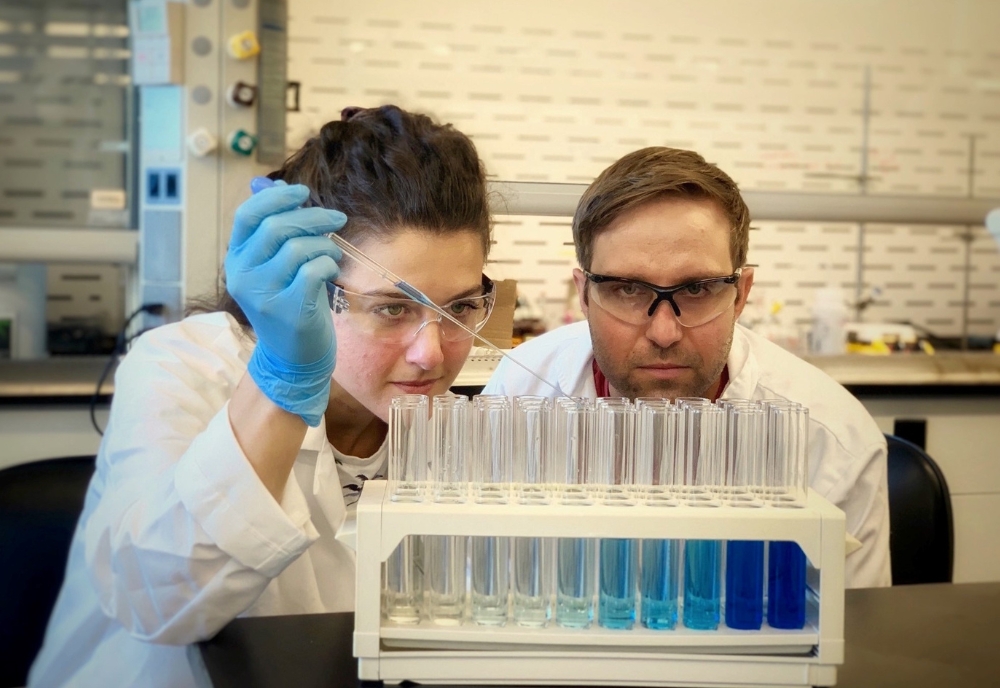Psychedelic substances are often stigmatized due to their hallucinogenic properties. However, alumni Chris Witowski, PhD, and Jackie von Salm, PhD, aim to change this perception. Through their company Psilera, they are developing non-hallucinogenic drugs that harness the therapeutic benefits of psychedelics, offering new treatment options for mental health disorders.
With support from the USF Presidential and Honors Scholarships, von Salm began her journey at USF, graduating with a bachelor's degree in chemistry in 2011. She then pursued her PhD in chemistry through the Department of Chemistry with support from the Theodore & Venette Askounes Ashford Doctoral Fellowship in Chemistry and the USF Graduate Student Success Diversity Fellowship. She served as president of the Graduate Student Council and frequently volunteered at the USF Botanical Gardens.
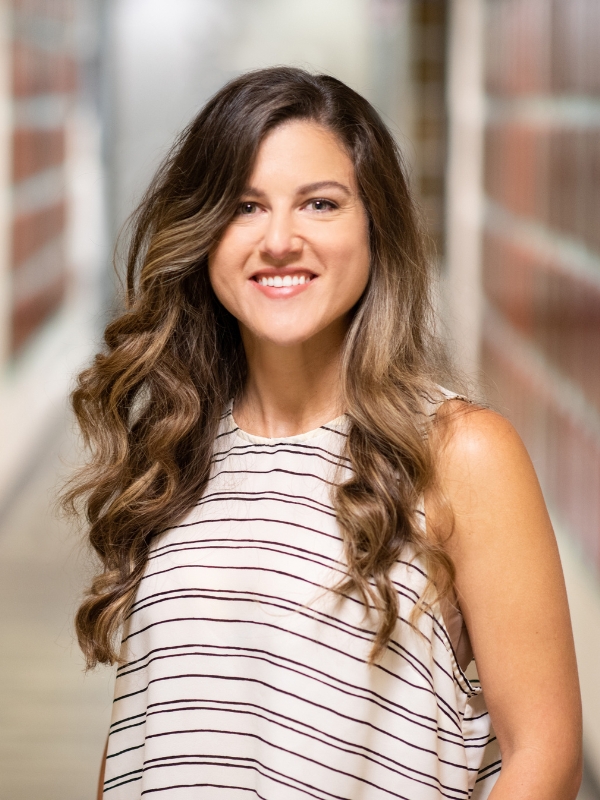
Co-founder of Psilera, Jackie von Salm, PhD. (Photo courtesy of Jackie von Salm)
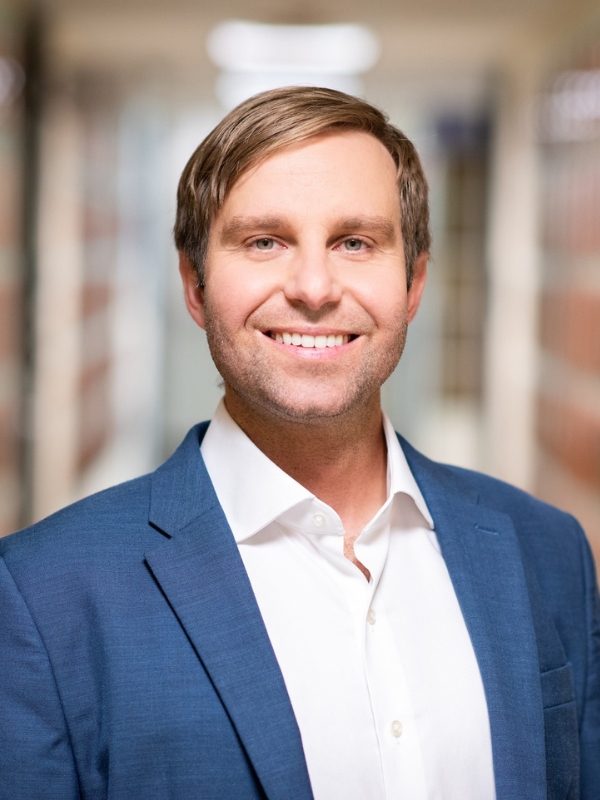
Co-founder of Psilera, Chris Witowski, PhD. (Photo courtesy of Chris Witowski)
During this time, Witowski was also pursuing a PhD in chemistry with the support of the Martin Travel Endowment and the Chris G. Zutes Memorial Scholarship. While attending USF, he started an intramural chemistry softball team, which von Salm later joined.
“We actually met during our PhD work because we both worked with Dr. Bill Baker, who is still part of the chemistry department today. Witowski started in the lab around 2011, just as I was finishing my undergraduate degree, and so we ended up pursuing our PhDs at the same time,” von Salm said.
“When I joined, I was trying to make friends with anyone who'd been in the lab for a long time, knew how to use the equipment, and overall, knew what they were doing and von Salm had been there for a while. In terms of our personalities, it was definitely a match. We were both very laid back in comparison to some of the others in the lab,” Witowski said.
Collaborating in the lab and playing on the same softball team strengthened the bond between Witowski and von Salm. During their PhD program, they began discussing the possibility of starting their own biotech company in the future.
“There’s a lot of different people that go into graduate school, especially for something like chemistry. At the time, there was a big push for finding better ways to get things off the shelf and into people's hands. Especially in academia, we saw time and time again so many promising projects with great potential end up forgotten on the shelves. We were both equally upset about that and wanted to find a way to change that. When discussing the possibility of creating a company, we felt like we were in a unique position—not fully in the pharmaceutical or corporate world, but also not as small as academia. We aimed to find that sweet spot in between to help advance our work effectively,” von Salm said.
Witowski graduated from the program in 2015, followed by von Salm in 2016. Not long after, the pair joined forces to launch Psilera in 2019. Their earlier conversations had now materialized into a biotech company focused on early-stage drug discovery and development.
“Our degrees were specifically in something called natural products chemistry, so the majority of the drugs or drug discovery came from nature. Whether it was marine products or plants it had a natural origin. I think there's always space for natural products research, but there’s a big question mark around why there hasn’t been more done around psychoactive compounds or psychoactive plants,” von Salm explained. “Almost everyone experiences mental health challenges at some point in their lives. Issues like psychiatric conditions, addiction, learning, and memory affect many people. When it came to psychedelics in context of mental health and brain health, we felt that it was a very neglected space. Obviously, there’s been a huge stigma around psychedelics or cannabis in general, but in recent years people have been more accepting, so it seemed like the perfect opportunity to use this to our advantage and help patients.”
“25 to 30% of people will have a mental illness at some point in their life and there haven’t really been any new drugs to treat these issues since the 1980s. When we were brainstorming around Psilera, the use of natural products had been dead for a long time and people were relying on synthesized drugs despite the utility of natural products in medicine. Around the mid to early 2000s, some of the clinical work being done with psychedelics was showing positive signs of alleviating depression and other mental conditions. In 2019, we began exploring extensive research on psychedelic drugs in clinical trials such as psilocybin (magic mushrooms) and Spravato (esketamine) used in treatments for mental disorders. Numerous academic studies were also being published, and the results were very promising. We started to see a shift in the mindset of the Federal Drug Administration (FDA) which served as a positive catalyst for us to make a biotech company,” Witowski explained.
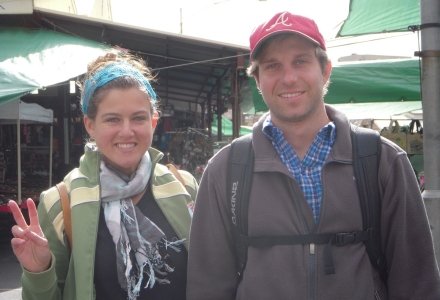
Jackie von Salm (left) and Chris Witowski (right) in Melbourne, Australia during the International Chemical Ecology Trip in 2013. (Photo courtesy of Jackie von Salm)
Witowski and von Salm are mindful of the general public's many concerns. Their main goal is to develop accessible, affordable, and effective medication for patients. To achieve this, they chose to derive properties from psychoactive compounds and make them non-hallucinogenic. This approach ensures the natural benefits of the compounds can be effective.
"For the past few years, a significant part of our work has involved attending talks, conferences, and engaging with political advocates and other stakeholders in Florida. Our goal has been to communicate that we are pursuing something different while also educating others on why we believe it is possible. I went to a conference in D.C. to meet with the FDA and Drug Enforcement Administration (DEA) to educate them on our research. I think that we've come a long way and people are starting to catch up, but it's still a work in progress,” von Salm said.
With Psilera approaching its fifth year, the company has made significant strides not only in advocacy and public education but also in its scientific endeavors. While most hallucinogenic drug treatments have shown positive effects on mental disorders such as depression and anxiety, Witowski and von Salm chose to focus on conditions where hallucinogenic properties are not necessary. Their team is particularly focused on a form of dementia called frontotemporal dementia (FTD).
This area of focus is particularly personal for von Salm, whose father passed away
from FTD after a decade-long battle with the disease. As medical advancements continue
to extend human lifespans, cognitive impairments such as dementia and Alzheimer’s
are becoming more prevalent, yet there are currently no available treatment options.
Witowski and von Salm are currently analyzing the molecular makeup of serotonin receptors.
Their goal is to rework the atoms of psychedelic drugs to produce similar effects
on the body, ultimately creating new treatment plans for this condition.
“Psilocybin is a classic psychedelic, and its atom makeup is nearly identical to serotonin. You just have to move a couple of atoms and put two methyl groups, and you've got serotonin. These drugs, like psilocybin, work on the serotonin system which is very important in regulating mood. We felt like starting with a natural product similar to serotonin would be a good starting point, because it’s able to mimic what your body naturally makes instead of trying to create something new, which can have many undesirable side effects,” Witowski explained. “Looking at a rare form of dementia like FTD, a lot of these patients have severe psychiatric issues, personality changes, and explosive outbursts. We think our drug is uniquely positioned for people with neurodegenerative disorders, including dementia, but also has a strong psychiatric component.”
After many years of hard work, Psilera is set to begin phase one of human clinical
trials with their first set molecule, PSIL-006.
“Right now, the goal of our clinical trial is really about safety and tolerability.
Everything tested to date has been on animals, so were testing to ensure that they
will work on humans. The biggest thing we will be assessing is if there are hallucinations
present or if we discover any other unexplained side effects. We haven't seen anything
to alarm us in the animals or any of the studies we've done, but it can be different
once humans are taking them,” von Salm said.
Specifically in cases of FTD, the hope for this clinical trial will be to follow the traditional FDA drug development path moving into phase two and phase three. In the FDA process, phase three typically involves comparing the drug being tested against current care. With no current treatments for FTD, this will allow Psilera to run their trial a bit faster.
While this offers hope for expedited patient access, Psilera acknowledges that they are still in the early stages of testing and anticipate a considerable journey before the product is market ready. An additional challenge that Witowski and von Salm face is securing FDA or DEA approval to study psychedelic compounds. They have been actively advocating for policy changes in psychedelic drug regulations, aiming to facilitate new research discoveries and expedite delivery to patients in need.
“From a research perspective a lot of these psychoactive compounds are still considered a schedule one, which means they're highly restricted. This schedule class makes it very difficult to conduct academic research. Biotech and pharmaceutical companies rely on this academic research to better understand these compounds. There needs to be regulatory changes in research and development where one doesn't necessarily have to go through the same hurdles as before just to conduct research on these topics,” von Salm said.
Both Witowski and von Salm have remained close to the university, even housing Psilera out of USF’s Research Park. Reflecting on their time at USF, both credit the opportunities available to them for shaping their current career journeys.
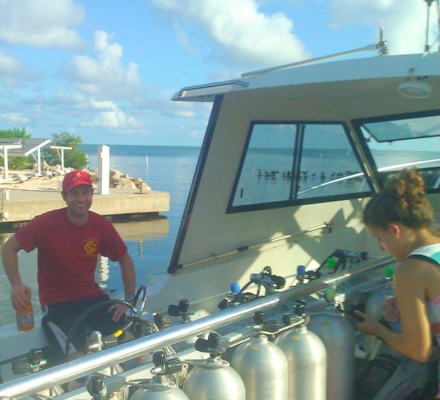
Chris Witowski (left) and Jackie von Salm (right) preparing for scuba diving research in the Florida Keys in 2013. (Photo courtesy of Jackie von Salm)
“I was born and raised in the Tampa area, and it's changed a lot even here on the USF Tampa campus. I had some really great mentors like my former principal investigator, Professor Baker. He was a big influence in my career and being able to work under him for five years taught me a lot about the field of natural chemistry and understanding its potential. There are also really great resources at the university and within the chemistry department. We’re now based out of the USF Research Park, which when I started back in 2011, wasn't even here. With Psilera, being part of the USF Connect Incubator it has connected us to a lot of innovators and resources within the USF community. There's no reason why Tampa Bay can't be another hub for innovative startups. We have a great talent pool, great ideas, and great resources to make it happen, so I’m really excited to be part of that future,” Witowski explained.
“Without USF, I definitely wouldn't be where I am today. I wasn't even sure I would be able to afford college and the scholarships available through USF definitely made it possible to find what my career path was going to be in. I had the opportunity to conduct undergraduate research with Professor Baker which included scuba diving to research natural marine products. But what really kept me here at USF was definitely his research and his teachings as a professor. As we transitioned into launching Psilera, a lot of the resources available here were unmatched, especially when you're a startup biotech company. We had access to equipment and connected with people that we respect and admire who were eager to help us achieve our goals,” von Salm said.
Looking ahead, the team at Psilera is enthusiastic about the progress they are making. Witowski envisions the future as a "golden age in mental health research," anticipating that new technologies, tools, and collaborations will lead to novel treatments not seen in several decades.
“Our population is getting older, so these age-related diseases like dementia or Alzheimer’s are going to become more prevalent. If you look at some of the U.S. demographics, stress and mental health really does affect your overall life and life expectancy. This drug class has the potential to significantly improve the lives of many. If people can live happier lives, it will benefit an enormous number of individuals,” Witowski said.
To learn more about the research initiatives of Chris Witowski and Jackie von Salm, please visit the website for Psilera.
